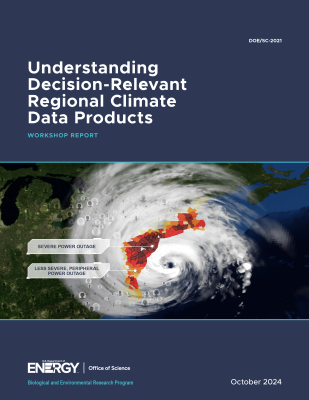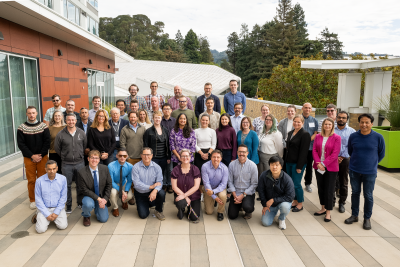Building a Coordinated National Earth System Data Strategy
EESM Publishes Understanding Decision-Relevant Regional Climate Data Projections Workshop Report
A growing challenge for climate researchers, decision makers, and other data end-users is managing and interpreting an ever-increasing volume of climate data.
To lay the groundwork for a national strategy for the coordinated management of data for climate projections, a select group of 82 earth system researchers, data producers, scientific data users, and federal agency representatives participated in a November 2023 workshop in Berkeley, California—both in person and virtually.
The product of the meeting, the Understanding Decision-Relevant Regional Climate Data Projections Workshop Report has now been published. Read the Executive Summary.
Multi-Agency Collaboration
The workshop was jointly funded by the U.S. Department of Energy’s (DOE) Earth & Environmental Systems Modeling (EESM) program’s Regional and Global Modeling and Analysis (RGMA) program area through the Program for Climate Model Diagnosis and Intercomparison (PCMDI), and the U.S. Department of Defense’s Strategic Environmental Research and Development Program (SERDP).
The workshop was coordinated by the U.S. Global Change Research Program’s (USGCRP) Interagency Group on Integrative Modeling (IGIM) and the Federal Adaptation and Resilience Group (FARG).
Several additional U.S. federal agencies that produce and disseminate regional climate data products were closely involved in the two-day workshop. They included the National Oceanic and Atmospheric Administration (NOAA), the National Aeronautics and Space Administration (NASA), the Federal Emergency Management Agency (FEMA), and the U.S. Environmental Protection Agency (EPA). Several state agencies also participated.
“It is very useful to have multiple agencies come together and develop strategies to share high-resolution data for the decision makers who are strengthening the reliability and security of the nation’s energy infrastructure,” said DOE Program Manager Renu Joseph.”
Forging Connections Between Data Producers, Experts, and Decision Makers
Paul Ullrich, an atmospheric scientist with the University of California Davis and Lawrence Livermore National Laboratory, and Daniel Feldman, an earth scientist at Lawrence Berkeley National Laboratory, co-chaired the workshop, which featured 10 data producer presentations, two panel sessions on meeting the needs of scientific data users, two panel sessions on data evaluation strategies, and three breakout sessions encompassing decision-relevant data, end-user needs, and evaluation strategy. It also included 11 technical talks and discussions on the next steps for climate data management.
According to Feldman, the workshop was designed to help the research community develop guidelines for producing, evaluating, and using local-scale regional climate projections of impact-relevant variables, such as surface air temperature, precipitation, humidity, and winds.
Workshop discussions focused on characterizing the strengths and weaknesses of climate data sets and how to forge connections between data producers, data experts, and data users.
One of the central topics of discussion was the downscaling of global earth system modeling (downscaling is the process of converting coarse resolution to fine spatial scale data). All operational approaches were considered, including statistical downscaling, dynamical downscaling, hybrid downscaling, and regionally refined global modeling.
As more and more data products have become available, challenges have emerged around the production, evaluation, selection, and use of these data products. Ullrich said this was the workshop’s motivation: “The scientific community must develop a coordinated national climate data strategy to ensure crucial decisions leverage the best possible historical and future physical earth system data.”
Feldman added: “The value of climate data lies not only in its availability but also in its quality and applicability. To address complex climate challenges, decision makers require access to reliable data that reflects the intricacies of the Earth’s systems and is supported by scientific expertise.”
The workshop and its resulting workshop report, concludes Ullrich, is only a first step in efforts to develop a community of practice around earth system data.
“We envision continuing to bring more interested parties and individuals to the table,” said Ullrich. “Long-term, we plan to build a sustainable effort to support activities like the National Climate Assessment, which needs climate data products, and to support decision makers in different sectors, like water management and energy, who have a craving for new climate data products.”
Steering Committee
Members of the workshop steering committee included:
- Paul Ullrich, Lawrence Livermore National Laboratory
- Dan Feldman, Lawrence Berkeley National Laboratory
- Sarah Abdelrahim, Federal Emergency Management Agency
- Daniel Barrie, National Oceanic and Atmospheric Administration
- Samantha Basile, U.S. Global Change Research Program
- Keith Dixon, National Oceanic and Atmospheric Administration
- Renu Joseph, U.S. Department of Energy, Office of Science
- David Herring, National Oceanic and Atmospheric Administration
- J. Kevin Hiers, Strategic Environmental Research and Development Program
- Hugo Lee, National Aeronautics and Space Administration, Jet Propulsion Laboratory
- Fred Lipshultz, U.S. Global Change Research Program
- Tanya Spero, U.S. Environmental Protection Agency


